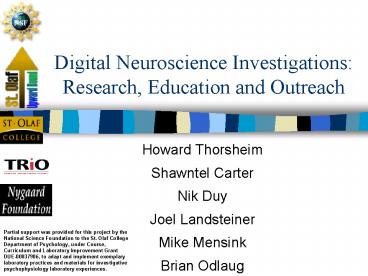Digital Neuroscience Investigations: Research, Education and Outreach - PowerPoint PPT Presentation
1 / 27
Title:
Digital Neuroscience Investigations: Research, Education and Outreach
Description:
We suggest handguns are in this category as well. The Recruitment of Disgust in Handgun Moralization ... It is immoral to have a handgun in the presence of a child. ... – PowerPoint PPT presentation
Number of Views:94
Avg rating:3.0/5.0
Title: Digital Neuroscience Investigations: Research, Education and Outreach
1
Digital Neuroscience Investigations Research,
Education and Outreach
Howard Thorsheim Shawntel Carter Nik Duy Joel
Landsteiner Mike Mensink Brian Odlaug
- Partial support was provided for this project by
the National Science Foundation to the St. Olaf
College Department of Psychology, under Course,
Curriculum and Laboratory Improvement Grant
DUE-00837906, to adapt and implement exemplary
laboratory practices and materials for
investigative psychophysiology laboratory
experiences.
2
What is Digital Neuroscience?
- Digital Neuroscience is a new frontier of
Neuroscience - Digital signal processing replaces old analog
approaches to brain and behavior studies
Analog signals are digitized and analyzed using a
variety of techniques.
3
Research Goals
- NSF DUE-00837906 Grant
- Investigate psychophysiology lab experiences
- Improve Lab practices materials
- Incorporate Digital Neuroscience at St. Olaf
- Nygaard Foundation Grant
- Feasibility Study Igniting The Mind
- Sponsors partnering between St. Olaf and High
schools through the Trio program - Partnering with The Bakken Museum of Electricity
and Life other industries in neuroscience - New NSF Grant Igniting The Mind
- Pioneering Event Related Potential (ERP) wavelet
analysis with St. Olaf Department of Physics with
Mike Olson and Dr. Amy Kolan - Independent Research Facial Muscle
Electromyogram and Disgust Working Memory
Investigations
4
Education Goals
- Modernization of Cognitive Science
Psychophysiology Lab - Creation of lab curriculum
5
Phase I Process
6
Phase I Components
7
The Event Related Potential Component Breakdown
What is an ERP? Event-related potentials are
patterned voltage changes embedded in the ongoing
EEG that reflect a process in response to a
particular event e.g., visual or auditory
stimuli.
- Orientation response
- Occurs almost immediately after the stimulus
- Characterized as reflexive pre-identification
response - P300, P3 wave
- Associated with decision making, reaction and
evaluation - Typically characterized as a positive wave
located roughly 300 ms after the stimulus
8
Catching an ERP
- Theory Many ERPs combined are responsible for
most all brainwaves. - Therefore, random ERPs drop out if averaged over
a period of time resulting in a stimulus specific
ERP.
9
EEG Results with Strobe Pulses
A sample of raw EEG and Stimulus start times
10
Visually Evoked Potential
A sample ERP obtained by averaging over 200
samples
11
Why Wavelet Analysis?
- The Need
- As opposed to Fourier analysis, using wavelets to
analyze EEG will let us know exactly what and
when particular events occur - Habituation
- The second reason for wavelet analysis is because
subjects adjust to the presentation stimulus
resulting in a decrease in authenticity of the
ERP wave
12
Foundations of Disgust
- Emotions are evolutionary responses
- Disgust evolved from a bad taste rejection
- Disgust has evolved from oral representations to
moral aspects, such as death and cigarettes.
(Rozin) - We suggest handguns are in this category as well.
13
The Recruitment of Disgust in Handgun
Moralization
- Questionnaire designed by Hertel, Huff, and
Mensink - Subjects rate agreement on scale of 1-5 with
questions
- I like handguns.
- I dont mind hearing people talk positively about
handguns. - Handguns are evil.
- It is immoral to have a handgun in the presence
of a child.
14
The Physiology of Disgust in Handgun Moralization
- Using physiological techniques, subjects
responses can be validated - Facial response to International Affective
Picture System (IAPS) - EMG sensors at zygomatic, corrugator and levator
labii muscles (Vrana)
15
Working Memory
- Also known as short-term memory
- Example Forgetting a phone number a few seconds
after hearing it
16
Working Memory
- Working Memory
- We will focus on the Phonological loop aspect of
working memory by examining covert behavior
17
Covert Oral Behavior
- Subvocalization
- Occurs when subject speaks silently to self
- Can be measured through electromyography (EMG)
18
Major Theoretical Controversy McGuigan vs.
Baddeley
19
Baddeleys Experiment
- Focused on working memory by testing participants
retention and recall of syllables (Da Ta Sa La
Na) - During retention intervals he had participants do
one of four activities (chewing, resting, tongue
between teeth or counting) - He also varied length of retention interval (0,
5, 10, 20 sec.)
20
Baddeleys Prediction
21
McGuigans Prediction
22
Goals
- Duplicate both Baddeley and McGuigans experiment
- Add four control conditions (chewing, tongue
between teeth, resting, counting) - Electromyography (EMG), Electrooculogram (EOG),
Video - Verify or refute Baddeley vs McGuigan
- Examine potential applications for
subvocalization and other covert behavior
23
Goals (cont.)
- Examine potential applications for
subvocalization and other covert behavior - Education Learning Disabilities
- Muscular disabilities
24
Outreach Goals Igniting the Mind
- Our current NSF and Nygaard grants include a
feasibility study on the impact of exposure to
digital neuroscience to stimulate interest in
science among minority, first-generation,
low-income high-school and middle-school
students. - We are partnering with Upward Bound to create
psychophysiology labs for high school students
from Humboldt, Red Wing, and North High Schools
this summer. - Results of the feasibility study will be vital
for new NSF grant we are writing this summer.
25
Outreach Pilot Experience With High School
Students EMG
High school students applying EMG sensors
Comments about the laboratory
26
Minds Ignited!
27
So What?
- A National Model is needed to ignite young minds
of under- represented groups in scientific
research and education - We are looking for that model






























